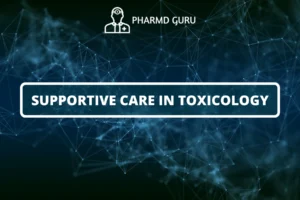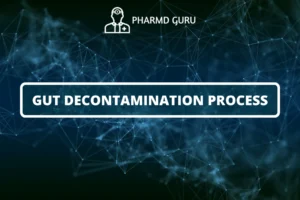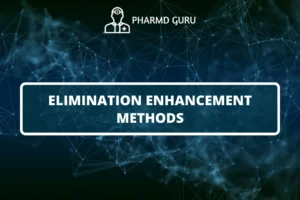Antidotes and the clinical applications is a topic in Clinical toxicology, which covers: Introduction, Mechanism of action of antidotes, list of antidotes recommended in poisoning, role of antidote in poisoning and universal antidote.
SCROLL DOWN TO THE BOTTOM OF THE PAGE FOR ACTUAL NOTES
TABLE OF CONTENTS:
- Introduction
- Understanding Antidotes
- Clinical Applications of Antidotes
- Common Antidotes and Their Uses
- Administering Antidotes
- Considerations and Precautions
Introduction
In cases of poisoning, the timely administration of antidotes can be life-saving. Antidotes are substances or treatments specifically designed to counteract the effects of toxic substances in the body. They work by either neutralizing the poison directly or by blocking its action on the body’s systems. This article explores the concept of antidotes, their clinical applications, common antidotes and their uses, as well as considerations for administering them effectively.
Understanding Antidotes
Antidotes play a crucial role in the management of poisoning incidents. When a toxic substance enters the body, it can cause various adverse effects on vital organs and systems. Antidotes work through different mechanisms to reverse or minimize these effects. They may act by binding to the toxic substance, enhancing its elimination from the body, or counteracting its specific effects on organs or biochemical processes.
Clinical Applications of Antidotes
Antidotes find application in various clinical scenarios, including:
- Pharmaceutical Overdoses: Antidotes are commonly used in cases of drug overdose, such as opioid antagonists for opioid poisoning or naloxone for heroin overdose.
- Chemical Exposures: In situations involving exposure to specific chemicals, antidotes can help neutralize their effects. For example, chelating agents like dimercaprol are used for heavy metal poisoning.
- Anticoagulant Reversal: Antidotes like vitamin K or prothrombin complex concentrate (PCC) can reverse the effects of anticoagulant medications, such as warfarin, in cases of bleeding emergencies.
- Toxicological Emergencies: Certain antidotes are specifically developed for particular toxins. For instance, antivenom is used for snake or spider bites, while cyanide poisoning may be treated with hydroxocobalamin or sodium thiosulfate.
Common Antidotes and Their Uses
Here are some widely used antidotes and their corresponding applications:
- Naloxone: An opioid antagonist used to reverse the effects of opioid overdose and respiratory depression.
- Flumazenil: Acts as a benzodiazepine receptor antagonist, used to counteract the sedative effects of benzodiazepines and treat overdose situations.
- N-Acetylcysteine: Used as an antidote for acetaminophen (paracetamol) poisoning, as it replenishes glutathione, which helps protect the liver.
- Atropine: An antidote for certain types of pesticide or nerve agent poisoning, as it blocks the effects of acetylcholine on the nervous system.
- Sodium Bicarbonate: Administered in cases of severe acidosis or certain drug overdoses to correct the acid-base imbalance and enhance elimination of toxins.
It is important to note that the choice and administration of antidotes should be done under the guidance of medical professionals and according to specific protocols.
Administering Antidotes
The proper administration of antidotes is crucial for their effectiveness. Some considerations include:
- Dosage and Timing: Antidotes should be administered at the appropriate dosage and as early as possible to maximize their therapeutic effects.
- Route of Administration: Antidotes can be administered through various routes, including intravenous (IV), intramuscular (IM), or oral, depending on the specific antidote and the patient’s condition.
- Monitoring and Follow-up: Healthcare providers should closely monitor the patient’s response to the antidote and adjust the treatment plan accordingly. Follow-up assessments may be necessary to ensure complete recovery.
Considerations and Precautions
When dealing with antidotes, it is important to keep the following in mind:
- Allergies and Sensitivities: Some individuals may have allergic reactions or sensitivities to specific antidotes. Careful consideration of the patient’s medical history and potential contraindications is essential.
- Adverse Effects: Antidotes themselves can have side effects or adverse reactions. Healthcare providers should be prepared to manage any potential complications that may arise during the administration of antidotes.
- Individualized Approach: The choice and use of antidotes should be tailored to the specific poisoning situation and individual patient characteristics. Treatment decisions should be based on a thorough assessment and professional judgment.
ACTUAL NOTES




